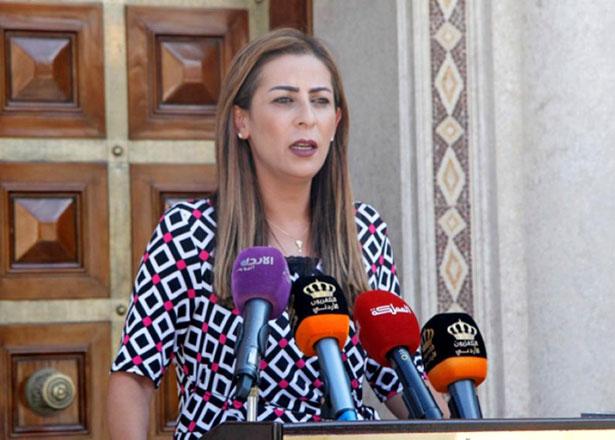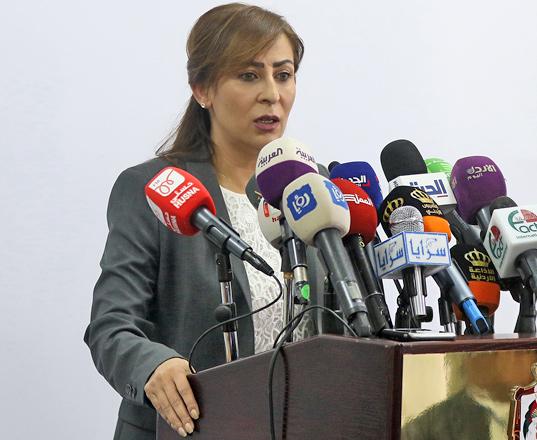You are here
‘Gov’t not detached from public atmosphere, aware of citizens’ distress’
By JT - Dec 14,2018 - Last updated at Dec 14,2018
AMMAN — Minister of State for Media Affairs and Government Spokesperson Jumana Ghunaimat on Thursday said that the government is not detached from the current public state in the Kingdom, the Jordan News Agency, Petra, reported.
“The government is fully aware that there are problems, challenges and economic distress and that there is a negative public atmosphere due to the difficult years Jordan has witnessed,” Ghunaimat added.
She stressed that the government believes in the right to protest, stressing that freedom of expression is not a gift or privilege, but a guaranteed right in the Constitution, provided that it is practised under the umbrella of the law.
“Dialogue is the only solution to our problems, and there is no other way to bring viewpoints closer,” she explained, adding that breaking the law in the process of expression must be punishable.
Ghunaimat pointed out that those who call themselves the “Jordanian opposition abroad” and call for constitutional monarchy only aim to incite Jordanians to take to the streets, describing their plans as “suspicious”.
“It is regrettable and dangerous that there are some people in Jordan listening to this small band, and we, as Jordanians, must watch out for this,” she said, stressing that these groups are uninformed about the ruling system in Jordan, which is indeed classified under a constitutional monarchy.
Ghunaimat explained that governments in Jordan are selected by His Majesty the King, but remain “illegitimate” until they gain the confidence of the Lower House, thus constituting the core of the constitutional process.
She said that demanding constitutional monarchy “distorts the Jordanian citizen and opens the door for a new set of demands”, considering that it reflects “malicious intentions”.
She further explained that the Lower House has the right to withhold its confidence in the government, considering that such a right reflects the constitutional status of Jordan, which the so-called “opposition abroad” is unaware of.
She added that the country is at the threshold of a new stage of political reform, as the government is in the process of reviewing the system of political party funding, to ensure that support would be given on the basis of the party’s platforms and achievements.
The government will also work to launch dialogue over the Election Law to come up with a new version in the coming stage, according to Ghunaimat.
The minister considered that the priorities set by the government for the coming two years might not meet the aspirations of Jordanians, but they constitute the first step on the right path towards the national renaissance project.
During the press conference, Ghunaimat outlined the government’s achievements from its first day in office, aimed at preserving public money and serving the citizens, stressing that the government’s efforts represent a “deeds-not-words” approach.
She pointed out that the government reduced and rationalised public expenditures by JD151 million, revaluated legislation governing integrity and preserving public money, put a specific mechanism in place to treat cancer patients and amended the Civil Retirement Law, particularly in relation to the article linking ministers’ entitlement to a lifetime pension to at least 10 years of public service.
The government’s procedures to control spending also included a no-purchase policy for government vehicles, returning surplus vehicles, reducing the special tax on hybrid vehicles and the exempting agricultural production inputs and outputs from the general sales tax, Ghunaimat added.
The government transferred the budget of 29 independent agencies to the state’s general budget, referred 53 cases raised in the Audit Bureau’s report to the Jordan Integrity and Anti-Corruption Commission (JIACC) and dealt with 50 financial violations, she said, adding that the JIACC has referred 123 cases to the judiciary this year, which have been investigated and proven to involve graft.
On the significant decline in the Amman Stock Exchange, Ghunaimat stressed that the government has taken measures regarding this issue and instructed regulating the income tax on shares.
Indicating that there was a misconception in this context, she pointed out that not anyone who owns shares has to pay the tax, but it only applies to profits from share trading.
Commenting on the detainees, Ghunaimat stressed the need to differentiate between those detained for criminal charges and those who are not.
On postponing of the Income Tax Law, Ghunaimat said that the law is linked to an agreement with the International Monetary Fund and a financial structural reform programme, stressing that the tax law is the most important step in addressing and redistributing the tax burden.
On the Jordanian-Syrian relations, Ghunaimat pointed out that the two sides are in contact, referring to the reopening of the Jaber-Nassib border crossing and the resumption of trade movement and stressing that the relationship between the neighbouring countries are well and advancing.
Related Articles
AMMAN — Minister of State for Media Affairs and Government Spokesperson Jumana Ghunaimat on Sunday held a meeting with the press at the Prim
AMMAN — Four employees at Mafraq’s Labour Department were detained on Wednesday for their alleged involvement in corruption, the Jordan News
AMMAN — The Minister of State for Media Affairs Jumana Ghunaimat on Thursday addressed the media on an Israeli airport opened near the borde


















